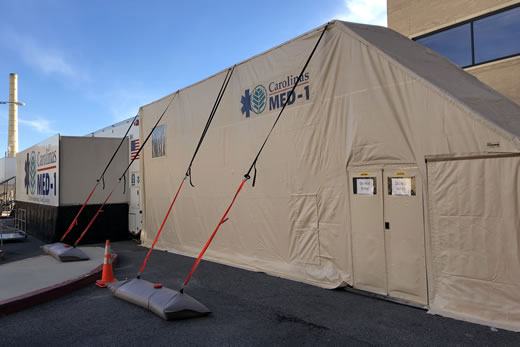What happens when you run out of room in the emergency department? You make more.
This season’s flu epidemic, which so far has accounted for more than 1,800 hospitalizations in the metro Atlanta area and 79 deaths in Georgia alone, has brought record numbers of patients into emergency departments across the city of Atlanta and the state.
Grady Memorial Hospital, home of Atlanta’s busiest ED, has seen a 25 percent increase a day in patients with flu-like symptoms.
“We’ll take care of anyone who shows up at our door—that’s what we do, that’s what we’re committed to,” says Hany Atallah, MD, chief of emergency medicine for Grady Health System and associate professor of emergency medicine at Emory
The leadership team of Atallah, assistant medical directors Brooks Moore, MD, and Matthew Wheatley, MD, and chief nurse practitioner Tryphena Pacitti, NP, PA, all part of Emory’s Department of Emergency Medicine, have taken extraordinary measures to make sure patient needs are met.
Solutions for the surge
In addition to adding several “surge shifts” for doctors and nurses during peak hours and repurposing spaces within the hospital to accommodate beds for the influx of patients, Grady rented a specialized trailer called the Carolinas MED-1, owned by Carolinas HealthCare System in Charlotte, NC, which has served as an extension of Grady’s emergency department.
The tractor-trailer sized unit has 14 patient bays separated by curtains, as well as medical equipment and a nurses’ station. It arrived on Jan. 27 and opened Jan. 30 at 8:30 a.m., with 83 patients passing through its doors the first day. Patients check in first in the main emergency department, where they are triaged and registered into the system, then are taken to the unit, set up just outside the Grady ambulance bays.
“You wouldn’t think that a mere 14 beds would make a significant impact,” says Pacitti. “But it allowed us to get patients through the emergency department much more quickly.”
The mobile unit cost the hospital about $200,000 for a 30-day rental, not including supplies. “It is expensive, but if you ask me, it’s worth every penny,” says Atallah.
Within the Carolinas MED-1 unit at Grady, Sheryl Heron, MD, MPH, emergency medicine physician and assistant dean of medical education and student affairs at Emory, reported that patient care was “well-run and efficient.”
“You just roll up your sleeves, you get in the game, and you take care of it,” says Heron. “That’s the beauty of our specialty.”
The team also restricted hospital visitation to those 15 and older, distributed hand sanitizer throughout the hospital, administered the flu vaccine to healthier patients, and offered masks to both patients and doctors in close proximity to sick patients.
Growth fuels increased demand
Despite a recently completed $78-million renovation of Grady’s emergency department, demand for healthcare continues to push limits as Atlanta grows.
“We averaged 403 patients a day last year. That’s a 10 percent increase over the year before,” says Atallah. And this year, Grady is averaging closer to 450 patients a day, and they have experienced two days with more than 500 patients in a 24-hour period.
“The rate of increase is accelerating,” says Atallah. “In a way, we’ve already outgrown our emergency department.”
“If you look at the population explosion in Atlanta, this sort of became the tipping point,” adds Heron. “We’ve reached capacity as you can see with traffic, with education—even before the flu, we had capacity issues. And as more people move to Atlanta, it would behoove us to really start to look at the population explosion and the ability for our various systems to handle it.”
Prevention and primary care
Looking ahead, Atallah says, the key is prevention.
“People's access to primary care is limited, so a lot of these patients seek primary care in emergency departments,” he says. “So the number of emergency department visits across the country continues to increase, and the number of EDs continue to decrease, and we therefore have no capacity for surge.”
As the flu epidemic continues, the emergency medicine staff keeps working long hours to take care of patients in need. The mobile ED, as long as it’s at Grady, will be open 24/7. “We will review patient volumes/patient care needs and determine if we will extend the lease beyond 30 days,” says Denise Simpson, media relations manager at Grady Health System.
“Our staff, our physicians, our clerks, techs, nurses, nurse practitioners, PAs—they’ve been absolutely unbelievable, in terms of stepping up to the plate to pick up extra shifts,” Atallah says. “You're trying to get to everyone as quickly as you can. We feel that our patients deserve it.”

